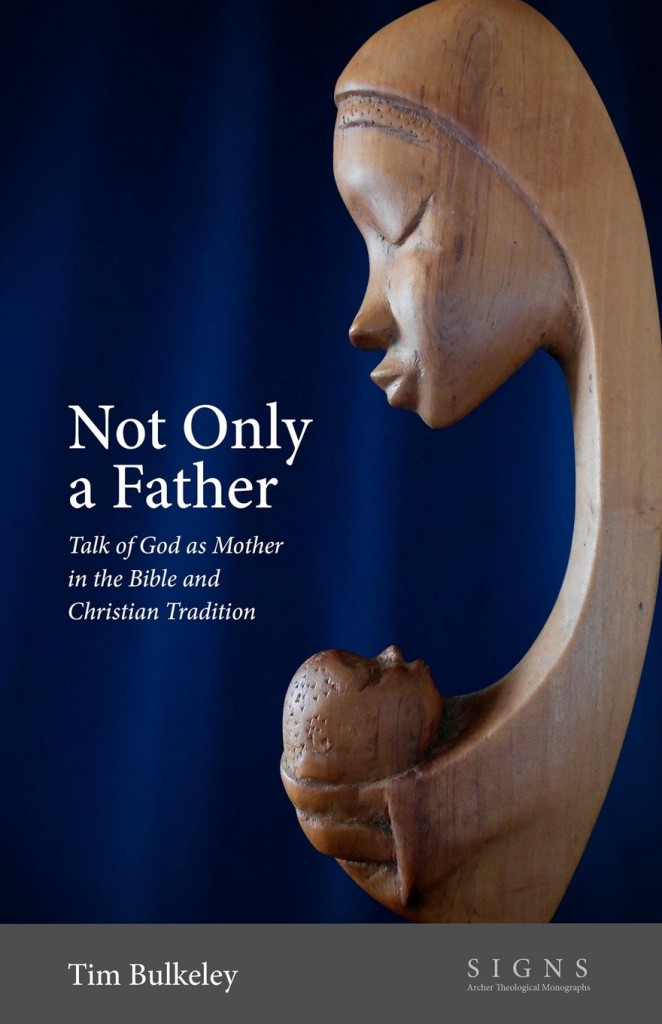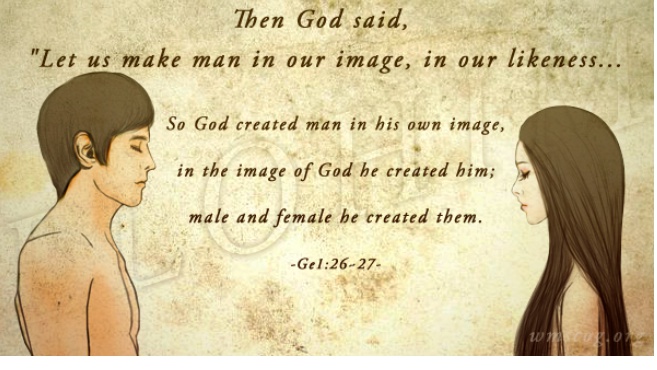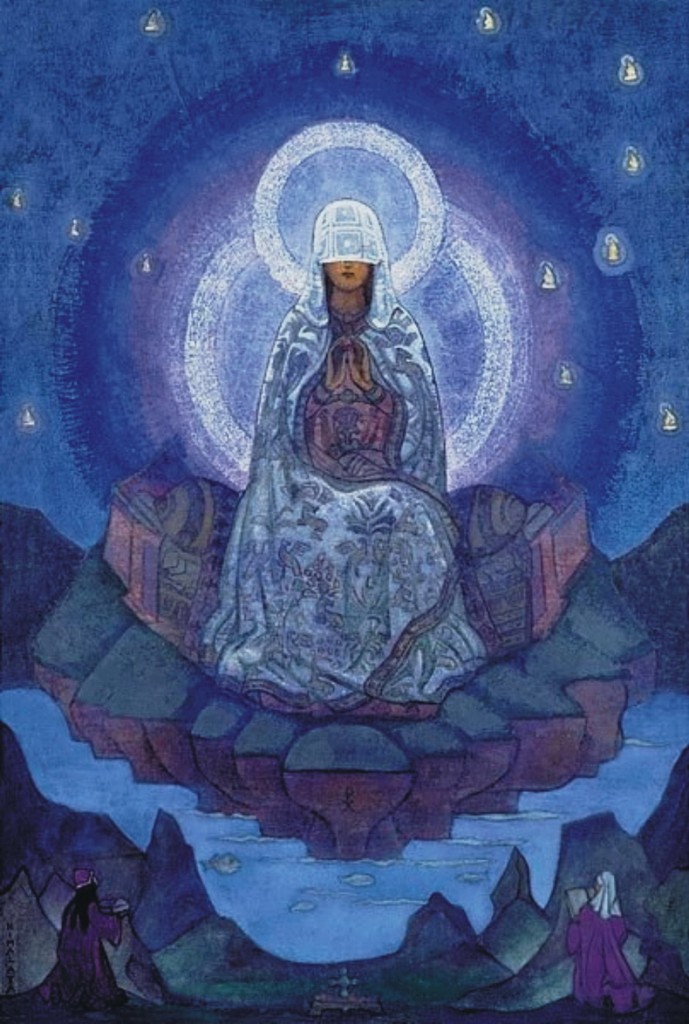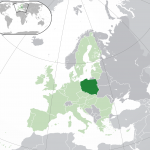God being referred to as “Mother”. This news follows
“Do you think the Church of England and Episcopal church and mainline Protestant churches have stopped going down the path of destruction? Not a chance. They will continue with the radical feminist agenda until they are actually holding hands with witchcraft and worshipping devils. If anyone is skeptical about feminist Christianity’s links with witchcraft they only have to read the feminist texts themselves.”
Whoa! Now he’s stepped on my turf. “Devil-worshiping” feminist and consorter-with-witches that I am.
In honor of Father’s Day, Longenecker offers his “12 reasons why you can’t call God ‘Mother'”. Several of my fellow Patheos Pagan bloggers have already responded to Longenecker, including Jason Mankey, Niki Whiting, Yvonne Aburrow, and Sara Amis. But I would like to do something a little different, and meet Fr. Longenecker on his own ground. I used to be Christian and my wife is still Christian, so I can still carry on a conversation within that framework. And what I find shocking about Longenecker’s article is not so much the conclusions he reaches, but the circularity of his reasoning. I actually agree with some of what Longenecker says, but it just leads me to the opposite conclusion.
So here’s my “12 reasons why you can’t (only) call God ‘Father'”:
1. Because “the Bible says it’s so” isn’t good enough any more: The New Testament is a first century document which was “conditioned by the patriarchal culture of its time.” Those who wrote the Gospels and the Espistles were born in a particular historical and cultural context and conditioned by that context. And any text must be interpreted — and this is especially true of the Bible. As James Madison wrote, “When the Almighty himself condescends to address mankind in their own language, his meaning, luminous as it must be, is rendered dim and doubtful, by the cloudy medium through which it is communicated.” The Word of God is rendered dim by the historically and culturally contingent nature of human language. That is why the Word of God needs to be reinterepreted in each succeeding generation — to keep it alive and vital. Otherwise, it becomes a dead idol.
 2. Because fathers are not “creators” without mothers: I remember a time when people like Longenecker were chanting “Adam and Eve, not Adam and Steve.” You need a male and female to create a baby, they argued. By that logic, God the Creator must be both male and female. Fr. Longenecker says that parental language is used in Christian and Jewish scriptures to describe God because of God’s function as creator and as a protector of the covenant people. But there is nothing about either of these roles that is exclusively masculine. In fact, creator and protector are often seen (rightly or wrongly) as more feminine roles in our culture.
2. Because fathers are not “creators” without mothers: I remember a time when people like Longenecker were chanting “Adam and Eve, not Adam and Steve.” You need a male and female to create a baby, they argued. By that logic, God the Creator must be both male and female. Fr. Longenecker says that parental language is used in Christian and Jewish scriptures to describe God because of God’s function as creator and as a protector of the covenant people. But there is nothing about either of these roles that is exclusively masculine. In fact, creator and protector are often seen (rightly or wrongly) as more feminine roles in our culture.
3. Liturgy matters: “We believe what we pray. We pray what we believe. To tinker with the liturgy is always to tinker with what we actually believe,” says Fr. Longenecker. He goes on, “When we start calling God ‘Mother’ people will start believing God is their Mother …” Uh, yeah. That’s right!
 4. “Father” does not “include” mother: Longenecker says that Christian scriptures draw on our experience of human parents “who are in a way the first representatives of God for [humans]”. According to Longenecker, “Father” language emphasizes God’s transcendence and authority over us, and “mother” language emphasizes God’s immanence and intimacy with us. Let’s just set aside how Longenecker reproduces cultural stereotypes here. Because then he goes on to claim that “father” language somehow includes “mother” language, rendering the latter superfluous. I know some people still (wrongly) use “man” when they mean “human” and “mankind” when they mean “humankind” (Longenecker actually does this in his article), but I have never heard anyone suggest that “father” is inclusive of “mother”!
4. “Father” does not “include” mother: Longenecker says that Christian scriptures draw on our experience of human parents “who are in a way the first representatives of God for [humans]”. According to Longenecker, “Father” language emphasizes God’s transcendence and authority over us, and “mother” language emphasizes God’s immanence and intimacy with us. Let’s just set aside how Longenecker reproduces cultural stereotypes here. Because then he goes on to claim that “father” language somehow includes “mother” language, rendering the latter superfluous. I know some people still (wrongly) use “man” when they mean “human” and “mankind” when they mean “humankind” (Longenecker actually does this in his article), but I have never heard anyone suggest that “father” is inclusive of “mother”!
5. Calling God “Father” is confusing: Longenecker says “our world is confused enough about gender right now.” But read the following quote by Fr. Longenecker and tell me who you think is really confused in this situation:
“We ought therefore to recall that God transcends the human distinction between the sexes. He is neither man nor woman: he is God. He also transcends human fatherhood and motherhood, although he is their origin and standard: no one is father as God is Father. …. Calling God both Mother and Father makes God some kind of transgendered being. Nope.” (emphasis added)
First of all, if God is “nether man nor woman”, why is God “he”?! And calling God both “Mother” and “Father” does not make God “transgendered”. It makes God a being that, in Fr. Longenecker’s own words, “transcends the human distinction between the sexes”. Insisting on exclusively masculine language to describe a being that is beyond gender is what is confusing.
6. Mothering God helps us relate to Her: Longenecker argues that we can only relate to other beings who are gendered and that gender must be male or female. He writes, “I cannot have a true relationship with someone who is neither male nor female. I can’t relate to an ‘it’.” First of all, this just highlights the limitations of our language, which objectifies anything we don’t gender. But in any case, Longenecker has already said that God transcends gender. So if we need gendered language to relate to God, then why not employ all the gendered language we have at our disposal? Why handicap ourselves with only male-gendered language to understand God?
 7. Calling God “Mother” helps to heal the ” mother wound”: Longenecker says that we all have a “father wound” because our relationships with our earthly fathers fall short. God helps fill this space. If that’s true, though, then we also all have “mother wounds” that likewise need to be healed and filled by God the Mother.
7. Calling God “Mother” helps to heal the ” mother wound”: Longenecker says that we all have a “father wound” because our relationships with our earthly fathers fall short. God helps fill this space. If that’s true, though, then we also all have “mother wounds” that likewise need to be healed and filled by God the Mother.
8. Second-class citizenship doesn’t cut it in heaven any more than it does on earth: Longenecker argues that Christians don’t need A Mother God, because they have Mary. That’s like saying, “We already have Jesus, so why do we need another male God?” I’m down with mariolatry, especially if you place Mary on par with Jesus as the co-redemtrix of humankind. But Mary’s divinity really does not have anything to do with the gendering of God, unless you want to say Mary is God.
 9. The Bible does speak of the Feminine Divine: Given the patriarchal context in which it was written, it’s not surprising that masculine language for God predominates in the Bible. Monarchic and military language also predominates, but that doesn’t stop us from relating the God in other ways. In any case, what is interesting is not the predominance of masculine language for God, but the fact that any feminine language made it through at all. The Bible does use feminine language to describe God. For example, Isaiah 49:15: “Can a woman forget her nursing child, or show no compassion for the child of her womb? Even these may forget, yet I will not forget you.” Longenecker says this is just the “symbolic language of mystics”. But isn’t that also true of masculine language as well? Else what does it mean to say that a god “without body [or] parts” is male? Proverbs 8 describes the goddess Sophia (Wisdom) as co-existing with God the Creator. And the Bible is replete with references to Asherah, who is now known (from both textual and archeological sources) to have been recognized as the wife of Yahweh. And let’s not forget that, in the Beginning, God created man and woman “in our image.”
9. The Bible does speak of the Feminine Divine: Given the patriarchal context in which it was written, it’s not surprising that masculine language for God predominates in the Bible. Monarchic and military language also predominates, but that doesn’t stop us from relating the God in other ways. In any case, what is interesting is not the predominance of masculine language for God, but the fact that any feminine language made it through at all. The Bible does use feminine language to describe God. For example, Isaiah 49:15: “Can a woman forget her nursing child, or show no compassion for the child of her womb? Even these may forget, yet I will not forget you.” Longenecker says this is just the “symbolic language of mystics”. But isn’t that also true of masculine language as well? Else what does it mean to say that a god “without body [or] parts” is male? Proverbs 8 describes the goddess Sophia (Wisdom) as co-existing with God the Creator. And the Bible is replete with references to Asherah, who is now known (from both textual and archeological sources) to have been recognized as the wife of Yahweh. And let’s not forget that, in the Beginning, God created man and woman “in our image.”
10. “Referring to God as ‘Mother’ is part of an overall plan to eradicate any sign of patriarchy from Christianity”: Yep.
11. You can worship God the Mother and be Christian: Longenecker argues that calling God “Mother” is “p-p-p-p-pagan”. Associating an idea with “paganism” is a classic method of condemning what are perceived to be Christian heresies. But even if you accept that paganism is a bad thing, worshiping God as Mother does not make you “pagan”. There is, I think, an important difference between Christianity (and other transcendental monotheisms) and Paganism. The former worships a God which is transcendent of nature, while the latter worships a God (or Goddess, or gods and goddesses) that are part of or identical with nature. Mothering God does not deny God’s transcendent nature. It just balances the transcendence of God with the immanence of God (in whom “we live and move and have our being.”) One need not cancel the other out, and the two can be held in creative tension.
12. Calling God “Mother” opens the door to gender equality here on earth: Longenecker says that calling God Mother “opens the door to New Age Witchcraft.” This is just more fearmongering, like the last item. What calling God “Mother” really opens the door to is recognizing that women are people too. As Sara Amis explains:
“You start letting people…especially women…realize that there’s a different way to think about things, that men and women aren’t separate species with first and second class citizen status respectively as ordered and enforced by a heavenly dudebro, that there’s such a thing as the Feminine Divine? Buddy, those ideas are dangerous. They lead to terrible things, like equal pay for equal work, ordination of women, dancing around bonfires, and drumming. The next thing you know women will get so above themselves they’ll be expecting to run countries and walk down the street in peace.”
I would urge you to go on over to Longernecker’s post and leave a comment, but alas he does not allow comments. I wonder why?
















